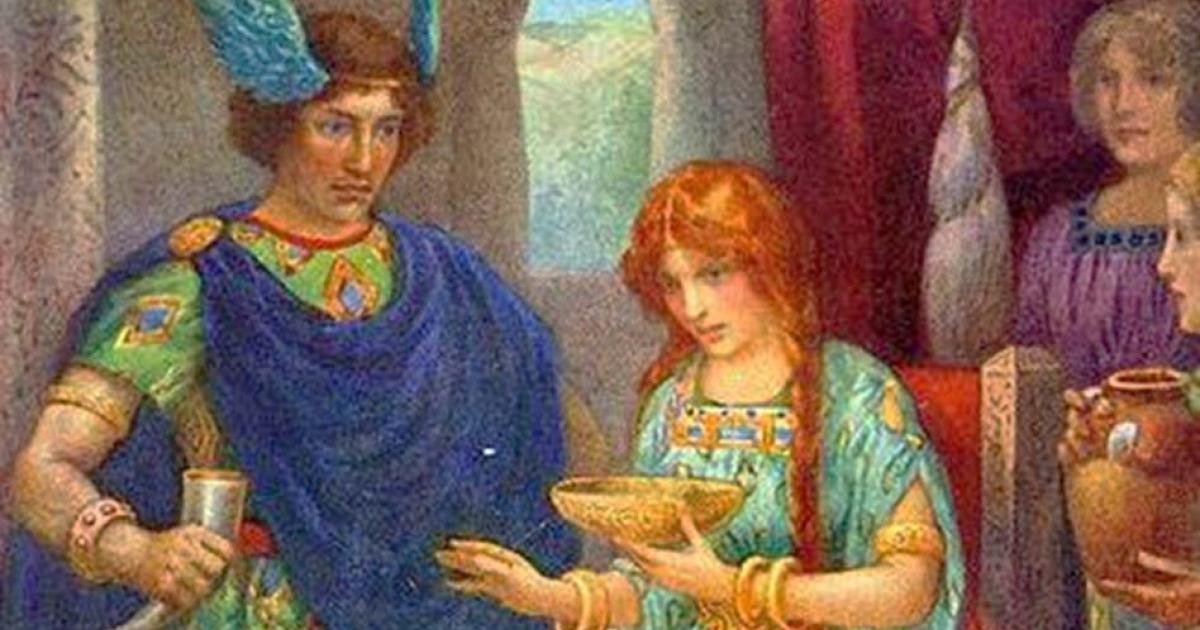
Freyr and Gerd: Lovesick Norse God Seeking Giantess
There is a well-known Norse myth which tells of how the Vanir Freyr fell in love with the giantess Gerd, wooed her, and eventually convinced her to marry him. She was not any easy catch - many attempts and various tactics were needed to gain the proud giantess’ hand…
In the Norse religion, Freyr was the son of the Vanir Njord and the twin brother of Freya. According to Norse mythology, Freyr and his father were sent to live with the Æsir as hostages in the peace agreement at the end of the Æsir-Vanir War. Freyr was worshipped as a god of fertility, prosperity, and good harvest. As for Gerd (whose name may be translated from Old Norse as ‘fenced-in’), she is said to be the daughter of Gymir, a little-known jötunn, and Aurboda. Gerd is best-known, however, for being Freyr’s wife.

Artwork by Jacques Reich showing the Norse god Freyr and his boar Gullinbursti. (Public Domain)
A Vanir Falls in Love
The myth of how Freyr fell in love with Gerd can be found in several different literary works. It begins with Freyr sitting on Hlithskjolf (Odin’s throne), where he looked over all the worlds. As he set his eyes on Jötunheimr, the homeland of the jötnar, the god saw a maiden walking towards a house on an estate. According to the Gylfaginning, one of the books in the Prose Edda, as the maiden opened the door of the house, “brightness gleamed from her hands, both over sky and sea, and all the worlds were illumined of her.” Freyr was immediately love-struck and removed himself from Odin’s throne with much sorrow.
- Old Norse Mystery: What Do the Couples Depicted on Thousands of Miniature Gold Amulets Symbolize?
- Njord: The Tumultuous Marriage of a Norse God of the Sea and a Goddess Giantess
- The Royal Mounds of Gamla Uppsala, Ancient Pagan Site of Sweden

Seated on Odin's throne Hliðskjálf, the god Freyr sits in contemplation. In his hand he holds a sickle and next to the throne sits a sheaf. (Public Domain)
A Melancholy Norse God
When Freyr returned home, his melancholy was perceived by his father, who bade Skirnir, one of Freyr’s servants, to ask his master what was bothering him. Skirnir did so and found out about Freyr’s dilemma. In the Gylfaginning, the god then sends Skirnir to woo the maiden, promising him a reward for his effort. In the Skirnismol of the Poetic Edda, on the other hand, Skirnir volunteers to woo the maiden for his master.
In both sources, Skirnir requests a horse and a sword from Freyr. Both the horse and the sword that Freyr gives Skirnir are magical objects, as the former could pass through magical flames, whilst the latter would fight on its own, if wielded by a worthy hero.

“The Lovesickness of Freyr”, by W.G. Collingwood, 1908. (Public Domain)
Skirnir eventually arrives at Gymir’s house, where he attempts to woo Gerd. Whilst the version in the Gylfaginning states merely that Skirnir succeeded in his quest, that of the Skirnismol elaborates on how Skirnir managed to accomplish the task. In this version of the myth, Skirnir attempts to purchase Gerd’s love for Freyr with precious gifts, firstly with 11 golden apples, and then with a magic gold ring that belonged to Odin (presumably Draupnir). Gerd refuses the gifts, telling Skirnir that there is enough gold in her father’s house.

A depiction of the meeting between Skírnir and Gerðr. (Public Domain)
Seeing that gifts would not persuade Gerd to love Freyr, Skirnir changes his strategy, and resorts to using threats instead. A long list of threats follows, including the promise of using Freyr’s magic sword to slay Gerd and placing various curses on her.
- Epic Battle Equals Doom or Twilight for Norse Gods? Ragnarök: The Real Message in the Myth
- Where is Vanaheimr, Land of the Norse Nature Gods?
- Skaði, The Norse ‘Giantess’ with a Godly Vendetta
Do Freyr and Gerd Live Happily Ever After?
In the end, Gerd agrees to meet Freyr nine days later in a forest called Barri. Skirnir returns to Freyr with the good news, though the god is impatient, and is not able to wait for nine days. Freyr expresses his anguish with the following, “Long is one night, longer are two; How then shall I bear three? Often to me has a month seemed less than now half a night of desire.”
In both the Skirnismol, and the Gylfaginning, the story comes to an abrupt end. It is generally accepted that after the nine tortuous days for Freyr, he meets Gerd meet in Barri and the two become husband and wife.

A guldgubbe, an amulet of gold from the iron age, found by Kongsvik, Nordland, Norway in 1747. It is thought to depict the Norse deities Frey and Gerðr. (Public Domain)
Top image: Skyrnir and Gerda - Illustration by Harry George Theaker (1920). Source: Public Domain
By: Wu Mingren
References
Anon., The Poetic Edda [Online]
[Bellows, H. A. (trans.), 1936. The Poetic Edda.]
Available at: http://www.sacred-texts.com/neu/poe/index.htm
Freyasdaughter, C., 2016. Happily Heathen: Know Your Lore – Why Freyr Won Gerd. [Online]
Available at: http://www.patheos.com/blogs/agora/2016/12/why-freyr-won-gerd/
Gill, N. S., 2017. Freyr and Gerd. [Online]
Available at: https://www.thoughtco.com/freyr-and-gerd-118401
Short, W. R., 2018. Freyr. [Online]
Available at: http://www.hurstwic.org/history/articles/mythology/myths/text/freyr.htm
Snorri Sturluson, The Prose Edda [Online]
[Brodeur, A. G. (trans.), 1916. Sturluson’s The Prose Edda.]
Available at: http://www.sacred-texts.com/neu/pre/index.htm
www.Norse-Mythology.net , 2018. Freyr: The God of fertility. [Online]
Available at: http://norse-mythology.net/freyr-the-god-of-fertility-in-norse-mythology/















